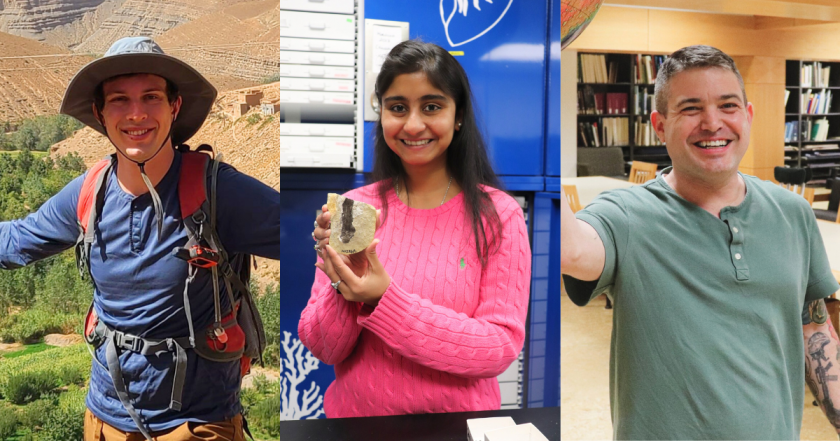Jackson School Grad Students Win Outstanding TA Awards
February 15, 2024
The Jackson School of Geosciences is the best represented school among the January winners of the Outstanding TA Award from the National Association of Geoscience Teachers (NAGT).
The association releases a list of awardees each January and June. Three Jackson School students – Eric Hiatt, Sinjini Sinha and Travis Stone – were among the 14 teaching assistants to be honored in January. The Jackson School winners are all doctoral students in the school’s Department of Earth and Planetary Sciences.

Department Chair Danny Stockli noted that talented teaching assistants are critical to the success of the department’s teaching mission.
“These three students are wonderful examples of what it means to go beyond expectations in contributing to our goal of educational excellence. A well-deserved recognition,” he said.
Winners receive a one-year membership in the NAGT, which includes an online subscription to the Journal of Geoscience Education and the organization’s quarterly magazine, In The Trenches.
Both undergraduate and graduate students are eligible for the award. Students are selected based on nominations from people familiar with their instruction and outcomes in the classroom.
Professor Sean Gulick nominated Hiatt, who taught the fall semester of Gulick’s GEO 416E course, Solid Earth Processes. Professor Rowan Martindale nominated Sinha and Stone, who taught lab and lecture sections for Martindale’s GEO 405 course, Life Through Time. Stone also developed virtual field trips used by the new GEO 416S course, Earth and Planetary Processes Through Time.
“I think geology courses give so many opportunities to relate subjects to student’s everyday lives, and I like to use that to help students get interested in and see the importance of what they’re learning,” Stone said.
While instructors offer a valuable perspective on TA’s teaching abilities, it’s students who benefit the most from having an excellent teaching assistant in the classroom. Bo Roden, who took Life Through Time with Sinha, appreciated how understanding and connected she was during the class.
“She taught in a way that made everything we were learning about in class as exciting as possible,” Roden said. “When the lab was exciting, the learning didn’t feel sluggish and was more interactive.”
Sinha incorporated board games designed by Martindale into the labs, and evaluated how well students retained knowledge before and after playing. The results showed that active learning methods such as these lead to higher learning gains. These results were published in the Journal of Geoscience Education.
“While working on research projects, we sometimes get too specific or deep into a particular topic. Then suddenly a student question (particularly from non-geology majors) makes me think — how do I simplify and explain? I understand the concepts better when I am teaching the concepts to the students,” Sinha said.
Hiatt said he feels most fulfilled when students experience an “aha” moment in class, especially if they had struggled previously. One of the ways he encourages these moments of growth is by engaging students through narrative.
“It is difficult to teach outside of rote memorization sometimes, but if you can make the information fit into the context of a narrative, I feel that makes it more relatable and comprehensible to the students,” he said.
